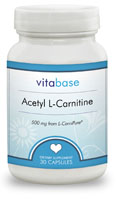| Carnitine is a protein found in all tissues and is essential in mammalian energy metabolism. It facilitates the entry of long-chain fatty acids into the mitochondria of the cells thereby delivering substrate, which are acted upon by enzymes, for oxidation and subsequent energy production. Humans obtain it from food, including red meat, milk and milk products; it is also produced by the body from the dietary amino acids, lysine and methionine. Most carnitine (90-98%) is stored in skeletal and cardiac muscles, at
levels roughly 10 times higher than the levels found in the blood. L-Carnitine has a direct positive effect on heart muscle function. It can improve the energy metabolism of heart muscle cells which have not received enough oxygen. It has been shown to strengthen the force of contraction and heart rate. It is also involved in mental function because it transports essential fatty acids to the brain. Therefore, L-Carnitine deficiency can lead to fatigue and weakness.
There are two types of carnitine deficiency, primary and secondary. In both primary and secondary carnintine deficiencies, increased dietary intake and supplements of carnitine can be beneficial. Although the exact mechanism is unknown, it is thought that flooding the body with high concentrations of carnitine assures that some carnitine are able to get into the cells. Carnitine deficiency occurs as a primary genetic defect of carnitine transport and secondary to a variety of genetic and acquired disorders. A person with primary carnitine deficiency has very low levels of carnitine in the blood due to a faulty carnitine transporter which prevents carnitine from getting into the cells where it is needed. The primary form of the disorder can be classified as either "systemic carnitine decificiency", which affects many organ systems including the heart and the brain, or "muscle carnitine deficiency", which is restricted to vouluntary muscles.
The secondary form of carntine deficiency can arise secondary to metalobic disorders in the mitochondria. Blockage of metabolic pathways in the mitochondria leads to a build-up of acyl compounds. Infants are particularly susceptible to carnitine depletion, because the demands of tissue accretion associated with rapid growth exceed the ability of the infant to synthesize carnitine. In infants and small children with small muscle masses, carnitine deficiency can develop easily due to a poor supply of protein in the muscles or a decrease in the dietary protein needed for synthesis. Sick children with metabolic disorders often rely on total parenteral nutrition (TPN) that is not routinely supplemented with carnitine, and a deficiency can develop within days or weeks. A chronic metabolic disorder, such as maple syrup urine disease (MSUD) which requires a special low protein diet, makes these infants and children even more vulnerable.
Carnitine plays a very important role in controlling the action of heart. Carnitine is an amino acid that is required for the transport of long-chain fatty acids into the mitochondria, the site of beta-oxidation of fatty acids. About 25 percent of the carnitine required by the body is produced by the liver and kidneys, while the rest is derived from dietary intake, primarily from red meat, poultry, fish, and dairy products. Most of the carnitine in the body is located in the voluntary and cardiac muscles.
Carnitine functions in the body as a carrier of fatty acids to the energy centers in muscles (mitochondria). A deficiency of carnitine results in decreased energy available to muscle, causing muscle weakness and low muscle tone. Energy is required for the growth of muscle and for weight gain, so the child with carnitine deficiency often fails to thrive. A deficiency can affect cardiac muscle and result in poor cardiac contractions (cardiomyopathy). This leads to heart failure which may respond dramatically to carnitine therapy. Carnitine deficiency can cause serious heart and liver problems. This may occur in inborn errors of metabolism, renal tubular dysfunction (Fanconi's syndrome), chronic renal failure, or with valproic acid (Depakene, Depakote) and zidovudine (Retrovir). In children, low concentrations of carnitine have been reported in: malnutrition, glutamic aciduria, Spanish oil poisoning syndrome, Duchenne muscular dystrophy, and low birth weight infants receiving total parenteral nutrition.
Both systemic and myopathic types are probably genetic and siblings may be affected. Myopathic carnitine deficiency resents with a lactic acidosis possibly arising because of an increased dependence on carbohydrate metabolism for energy. Plasma carnitine may be slightly low or normal but musccle carnitine is low. It is not known whether the defect is increased leakage of carnitine from muscle or decreased uptake. Muscle biopsy shows a gross lipid storage myopathy. Some patients benefit from corticosteroid therapy. Patients with systemic carnitine deficiency have a progressive neuromuscular disorder with nausea and vomiting. Occasionally, hypoglycaemia and dicarboxylic aciduria have also been reported. The condition may progress to coma and death.
Carnitine deficiency can result from a reduced capacity for its biosynthesis, subnormal levels of carnitine palmitoyltransferase; alteration in cellular mechanisms for carnitine transport, excess loss of carnitine due to diarrhea, diuresis, or hemodialysis, increased requirements for carnitine in states of ketosis and high demand for fat oxidation; and inadequate intake during long-term TPN. Among people with diabetes, carnitine deficiency is more likely to be found in persons experiencing complications of diabetes (such as retinopathy, hyperlipidemia, or neuropathy), suggesting that carnitine deficiency may play a role in the development of these complications. A carnitine deficiency can also result from oxygen deprivation which can occur in some heart conditions. | 